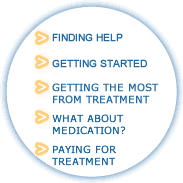You are here
Get Professional Help If You Need It
 If the problems in your life are stopping you from functioning well or feeling good, professional help can make a big difference. And if you're having trouble, know that you are not alone: One in four adults in this country have a mental health problem in any given year.
If the problems in your life are stopping you from functioning well or feeling good, professional help can make a big difference. And if you're having trouble, know that you are not alone: One in four adults in this country have a mental health problem in any given year.
If you or someone you know is feeling especially bad or suicidal, get help right away. You can call 1-800-273-TALK (8255) to reach a 24-hour crisis center or dial 911 for immediate assistance.
 Of course, you don't have to be in crisis to seek help. Why wait until you're really suffering? Even if you're not sure that you'd benefit from help, it can't hurt to explore the possibility.
Of course, you don't have to be in crisis to seek help. Why wait until you're really suffering? Even if you're not sure that you'd benefit from help, it can't hurt to explore the possibility.
A mental health professional can help you:
- come up with plans for solving problems
- feel stronger in the face of challenges
- change behaviors that hold you back
- look at ways of thinking that affect how you feel
- heal pains from your past
- figure out your goals
- build self-confidence
Most people who seek help feel better. For example, more than 80 percent of people treated for depression improve. Treatment for panic disorders has up to a 90 percent success rate.
Treatment for a mental health issue can include medication and psychotherapy. In some cases, the two work well together.
What, exactly, is psychotherapy? It's a general term that means talking about your problems with a mental health professional. It can take lots of forms, including individual, group, couples and family sessions. Often, people see their therapists once a week for 50 minutes. Depending on your situation, treatment can be fairly short or longer-term.
Some people worry that getting help is a sign of weakness. If you do, consider that it can be a sign of great strength to take steps toward getting your life back on track.
FINDING HELP
- Get names of mental health professionals from your doctor, friends, clergy or local Mental Health America affiliate. If your workplace has an employee assistance program, it also can provide help. For more ways to find professionals, see Mental Health America's How to Find Treatment FAQ.
- Interview more than one professional before choosing, if possible. You'll want to feel comfortable with the person.
- You can see a psychologist, psychiatrist, social worker, pastoral counselor or other type of mental health professional. Of these, only a psychiatrist can prescribe medication.
- Sometimes, your health insurance company will cover only certain types of providers, so check how your plan works.
GETTING STARTED
If you've never been to a mental health care provider, it can feel a little daunting. Knowing what to expect and following a few suggestions can make it easier.
- Before you call, prepare a list of questions, like:
- What experience do you have treating my issues?
- Do you have a particular approach, expertise or training?
- What does treatment cost?
- Do you work with my insurance plan?
- When you call, you may get an answering machine or service. Leave times the provider can reach you and whether or not it's OK to leave a message on your answering machine or with the person who answers your phone.
- Think about what traits you'd like in your provider. If you're going to be talking to someone about your most personal problems, you want to feel comfortable. Consider if you'd prefer to see a man or woman, if you care whether the person is older or younger, or if there are any other traits that matter to you.
- During the first visit, you should expect that the therapist will ask questions about your background and why you're seeking help. You can ask questions, too, like what treatment would involve and how long it might last. If you're concerned, you can also ask about confidentiality. Usually, though, it's understood that the provider respects your privacy—and that group members do too, if you're meeting in a group.
GETTING THE MOST FROM TREATMENT
Your relationship with your provider is like a partnership. You'll get more out of if you:
- Tell your provider your goals for treatment. Think about whether there are certain behaviors or issues you care about most.
- Keep an open mind. Be willing to consider new ways of behaving and thinking that might improve the quality of your life.
- Recognize that talking about personal issues can be tough, but it can help you overcome them. In time, treatment should help you develop more coping skills, stronger relationships and a better sense of yourself.
- If you think you're not making progress, you should tell your provider. A good provider will want to work with you so you can get the most out of your sessions. If, after discussing your concerns, you're still not comfortable, you might consider looking for another provider.
- Be honest. Your provider can't really help you if you don't share the whole picture. Don't say you're fine if you're not.
- Share any concerns about your overall health. It makes sense that you should work with your provider on overall health issues because your mental health and overall health are so closely related.
WHAT ABOUT MEDICATIONS?
Some people with mental health issues find medications very helpful. Still, medications may cause side effects that can be annoying or sometimes even dangerous. You may want to weigh the pros and cons of a particular drug with your provider. You might also decide that you'll try medication for a while and then re-evaluate.
If you decide to take medication, you may have to wait a few weeks before you start feeling better. Your provider will want to know how you're doing and may suggest a different medication if the first one doesn't work well. It can be dangerous to stop taking a medication suddenly, so always talk to your doctor first.
If your provider prescribes a medication, ask:
- What is this medication supposed to do?
- How soon should I expect to feel better?
- When do I take it?
- Do I need to avoid certain foods, drinks or other medications?
- Do I take it with food or on an empty stomach?
- What are the possible side effects?
- What can I do if I get side effects?
PAYING FOR TREATMENT
People often have concerns about paying for treatment. Some information may help you figure out what you can afford:
- If you have insurance, find out if it covers mental health services and the extent of the coverage, including limits on the number of visits allowed. To qualify for coverage, you might also be required to take certain steps, such as getting a referral from your primary care doctor.
- If you have Medicaid or Medicare, the Medicare Participating Physician Directory can help you find a provider who accepts Medicare. Your state Medicaid office, which you can find using the map on the National Association of State Medicaid Directors website, may be able to help you locate a provider who accepts Medicaid.
- If you have no coverage, you can ask your community mental health center about lower-cost services. In many states you can dial 2-1-1 to find a community mental health center. You can also contact your local Mental Health America affiliate or Mental Health America's national resource center.
- If you want more information, see MHA FAQs on affordable treatment and paying for prescriptions.
ADDITIONAL RESOURCES
You'll find more a lot more information through Mental Health America's Frequently Asked Questions. You can also contact your local Mental Health America affiliate.
For descriptions of treatment options, visit the National Institute of Mental Health's page on types of therapy.
Reviewed by Ruth Montag, MSW, director, Mental Health America Resource Center.
The 10 Tools
- Connect with others
- Stay positive
- Get physically active
- Help others
- Get enough sleep
- Create joy and satisfaction
- Eat well
- Take care of your spirit
- Deal better with hard times
- Get professional help if you need it








this page